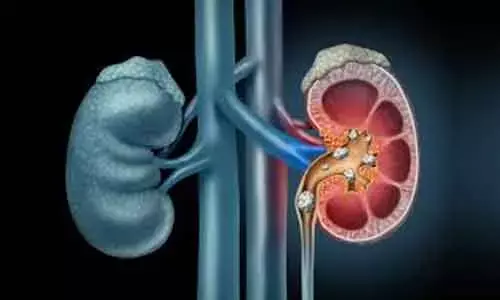- Home
- Medical news & Guidelines
- Anesthesiology
- Cardiology and CTVS
- Critical Care
- Dentistry
- Dermatology
- Diabetes and Endocrinology
- ENT
- Gastroenterology
- Medicine
- Nephrology
- Neurology
- Obstretics-Gynaecology
- Oncology
- Ophthalmology
- Orthopaedics
- Pediatrics-Neonatology
- Psychiatry
- Pulmonology
- Radiology
- Surgery
- Urology
- Laboratory Medicine
- Diet
- Nursing
- Paramedical
- Physiotherapy
- Health news
- Fact Check
- Bone Health Fact Check
- Brain Health Fact Check
- Cancer Related Fact Check
- Child Care Fact Check
- Dental and oral health fact check
- Diabetes and metabolic health fact check
- Diet and Nutrition Fact Check
- Eye and ENT Care Fact Check
- Fitness fact check
- Gut health fact check
- Heart health fact check
- Kidney health fact check
- Medical education fact check
- Men's health fact check
- Respiratory fact check
- Skin and hair care fact check
- Vaccine and Immunization fact check
- Women's health fact check
- AYUSH
- State News
- Andaman and Nicobar Islands
- Andhra Pradesh
- Arunachal Pradesh
- Assam
- Bihar
- Chandigarh
- Chattisgarh
- Dadra and Nagar Haveli
- Daman and Diu
- Delhi
- Goa
- Gujarat
- Haryana
- Himachal Pradesh
- Jammu & Kashmir
- Jharkhand
- Karnataka
- Kerala
- Ladakh
- Lakshadweep
- Madhya Pradesh
- Maharashtra
- Manipur
- Meghalaya
- Mizoram
- Nagaland
- Odisha
- Puducherry
- Punjab
- Rajasthan
- Sikkim
- Tamil Nadu
- Telangana
- Tripura
- Uttar Pradesh
- Uttrakhand
- West Bengal
- Medical Education
- Industry
Positioning during PCNL for complex kidney stones may not impact the success rates

Brazil: In a new study led by Rodrigo Perrella, it was found that positioning in percutaneous nephrolithotomy (PCNL) for complicated kidney stones had no effect on success rates; hence, any posture may be appropriate. However, the supine posture (SUP) may be associated with a decreased risk of high-grade complications. The findings of this study were published in the Journal of Urology.
There is a dearth of high-quality evidence comparing supine to prone percutaneous nephrolithotomy for the treatment of complicated stones. The purpose of this study was to compare the results of supine (SUP) and prone (PRO) PCNL.
In this study, the CONSORT (Consolidated Standards for Reporting Trials) criteria were used to conduct a noninferior randomized controlled trial. Patients over the age of 18 with complicated stones met the inclusion criteria. SUP was conducted in the modified Barts flank-free posture. Except for the placement, all of the surgical factors were the same. The primary outcome was the difference in success rates between groups on the first postoperative day (POD1). The difference in the stone-free rate (SFR) on the 90th postoperative day was the secondary endpoint (final SFR). The non inferiority margin was set at 15%. The groups were compared in terms of demographic, operational, and safety characteristics. The statistical significance level was chosen at p 0.05.
The results of this study stated as follow:
1. In all, 112 individuals were randomized, and their demographics were comparable. POD1 success rates were comparable (SUP: 62.5% versus PRO: 57.1%).
2. The recorded difference (5.4%) was less than the preset limit.
3. The final SFRs were likewise comparable (SUP: 55.4% versus PRO: 50.0%).
4. SUP had a shorter operational time (meanSD 117.939.1 minutes vs 147.638.8 minutes, p 0.001), although PRO had a higher risk of Clavien 3 complications (14.3% vs 3.6%).
In conclusion, urologists should be aware that both procedures can be used to treat complicated stones. The surgical method should ultimately be determined by the surgeon's discretion and the placement of the stone.
Reference: Rodrigo Perrella, Fabio C. Vicentini, Eliane D. Paro, Fabio C. M. Torricelli, Giovani S. Marchini, Alexandre Danilovic, Carlos A. Batagello, Priscila K. V. Mota, Daniel B. Ferreira, David J. Cohen, Claudio B. Murta, Joaquim F. A. Claro, Guido Giusti, Manoj Monga, William C. Nahas, Miguel Srougi, and Eduardo Mazzucchi. Supine versus Prone Percutaneous Nephrolithotomy for Complex Stones: A Multicenter Randomized Controlled Trial. https://doi.org/10.1097/JU.0000000000002291
Medical Dialogues consists of a team of passionate medical/scientific writers, led by doctors and healthcare researchers. Our team efforts to bring you updated and timely news about the important happenings of the medical and healthcare sector. Our editorial team can be reached at editorial@medicaldialogues.in.
Dr Kamal Kant Kohli-MBBS, DTCD- a chest specialist with more than 30 years of practice and a flair for writing clinical articles, Dr Kamal Kant Kohli joined Medical Dialogues as a Chief Editor of Medical News. Besides writing articles, as an editor, he proofreads and verifies all the medical content published on Medical Dialogues including those coming from journals, studies,medical conferences,guidelines etc. Email: drkohli@medicaldialogues.in. Contact no. 011-43720751


